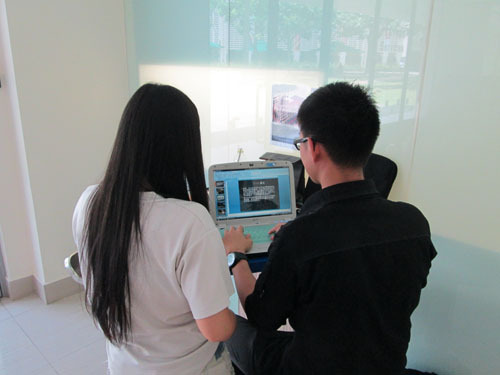
Singapore is recognized globally as a high-performing education system.
As Dr. Pak Tee Ng reported to us almost a year ago, Singapore has been implementing technology in its education system since 1997. A three step “Masterplan” initiative was kicked off beginning with Masterplan One (1997-2002), the goal being to allow students computer usage for 30 percent of their curriculum time in fully networked schools with a computer to pupil ratio of 1:2. Masterplan Two of Singapore Information and Communications Technology (ICT) was aimed at motivating teachers to use ICT effectively in teaching and learning. Masterplan Three (2009-2014), currently in progress, is built on the first two Masterplans but aims to be more transformative, the goal being to equip students with the critical competencies to succeed in a knowledge economy. How are they doing in K through 12 and beyond? I asked Dr. Pak Tee Ng to give us an update.
Dr. Pak Tee Ng is Associate Dean, Leadership Learning, Office of Graduate Studies and Professional Learning, and Head and Associate Professor, Policy and Leadership Studies Academic Group, at the National Institute of Education, Nanyang Technological University, Republic of Singapore.
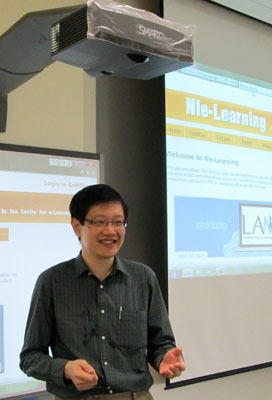
How has technology impacted the Singapore education system? What do you see as the pros and cons from a learning standpoint?
Nowadays, campus-wide wireless Internet connectivity, classroom computers with projection equipment, teachers and students with their own laptops or other mobile ICT devices are commonplace in Singapore schools. Technology is quite pervasive, but it is not the equipment that we are interested in. From a learning standpoint, we are more interested in how technology can transform learning and bring it to a higher level for our students. Singapore believes in the use of technology in education. But we are cautious that we do not use technology for the sake of using it. Inappropriately used, technology can be a distraction rather than a help. We are encouraging our teachers to explore more in this area.
How is the role of the Singapore teacher changing in the digital age?
In the digital age, there will be a lot of information that is available in the virtual medium. Teachers have to help students make sense of this large volume of information and to differentiate good information from potential misinformation. Teachers have to facilitate student discourse in the e-discussion forums and lead students in creating actual usable knowledge. These learning activities require a high level of facilitative and synthesizing skills. However, that does not mean that teachers do not conduct face-to-face teaching. Contact hours become more valuable and should be focused on higher order thinking and learning, instead of information transmission.
Although the use of ICT is not exactly new in education, there is still a lot of room for development in this area. Therefore, teachers are encouraged to be change agents of educational processes, so that new technologies may be harnessed for educational purposes. Senior teachers also play the role of mentors to beginning teachers in the effective use of ICT in their respective disciplines and to champion appropriate change.
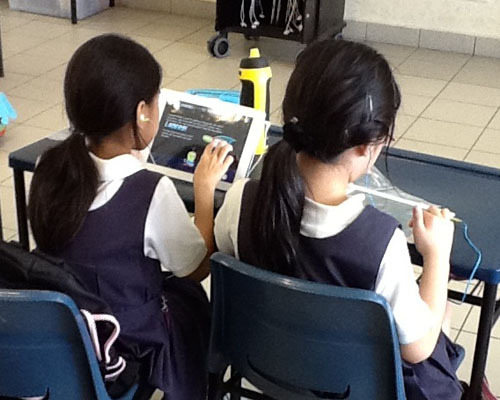
Entire states in the US have adopted digital textbooks. University libraries are becoming repositories of digital content. Many would say textbooks have already gone digital and indeed, the next generation of digital content is not far behind. What digital learning tools have been implemented in Singapore and what do educators see as the pros and cons of these?
Digital learning tools are getting more popular and pervasive in Singapore. University libraries are indeed going digital. In fact, they are more accurately described as a ‘space’ than a ‘place’. Most academics and research students nowadays will download an e-article than read a hard-copy journal.
Many desktops have been phased out. Laptops, tablets, iPads and Androids are quite common among young people. Various schools have also implemented Learning Management Systems (LMS’s) such as Blackboard, WebCT and Moodle. But, as I said, we are not as interested in the tool itself as the pedagogy that it can enable. Technology should not be used just to support traditional teaching methods in terms of productivity. Instead, the challenge is to learn how technology can be used in a student-centered manner to enhance student learning or even to bring about learning that was not possible in the past without technology. In the digital age, information is made more easily available and that is good for education. However, having information easily available is not the same as having better learning. We are more interested in raising the standards of learning, rather than just having more information.
How has technology impacted curriculum design in Singapore?
In general, curriculum should be designed to achieve challenge, enjoyment, breadth and depth, personalization and choice, coherence and relevance. It is quite apparent that technology has the power to help in each of these areas. One of the advantages of ICT is that it can expand access to education. Through ICT, students can access online course materials anytime and anywhere, learning at their own pace. E-discussion forums allow many students to discuss learning content at the same time. Video clips, audio sounds and graphical presentation bring content to life.
In Singapore, one of the main impacts of technology is a shift in the mindset of educators to discover how curriculum and the teaching environment can become more learner-centered through the enabling of ICT. Instead of always relying on the traditional curriculum, we now have more experiments with modular approaches, flipped classrooms and learning content beyond the shores of Singapore. However, while encouraging experimentation, we continue to take a balanced and judicious approach in this area, paying attention not just to the tools but also to capacity building among educators for change. The use of technology and changes in curriculum design need to move in tandem.
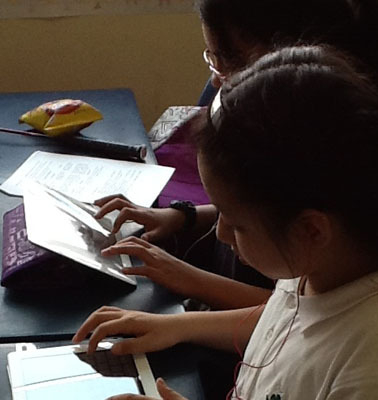
The latest Pew research once again indicates that the use of tablets, mobile phones, Internet sources and social media platforms such as Facebook and Twitter continues to infiltrate classrooms in the US rapidly. Are you seeing the same trend in Singapore classrooms? To what extent is the use of these tools part of your curriculum? Is there an age below which you believe these tools are not appropriate in classrooms?
In Singapore, the use of tablets, mobile phones, Internet sources and social media platforms such as Facebook and Twitter is commonplace among young people. It is a lifestyle change, rather than an education change. In general, schools are free to experiment with social media tools as learning tools. Our concern is the responsible use of such tools among young people. We are educating the young regarding issues of cyber-wellness and cyber-bullying.
Is there an age below which ICT tools are not appropriate in classrooms? This is a difficult question to answer authoritatively. Some researchers do not recommend computer use for children under 3 years old. There may be a problem of confusing “real” with “virtual” when children are too young. In Singapore, we are trying out some ICT tools, such as iPads, with preschoolers. But again, we are cautious and balanced in our approach. Preschoolers are at a stage of learning to master skills such as speaking and making friends. They should interact more with human beings and natural objects. So, we start in a small way in preschool, and incrementally expose children to such tools at the higher levels, while educating them about cyber-wellness.
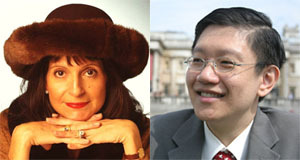
Photos courtesy of Pak Tee Ng and National Institute of Education, Nanyang Technological University, Republic of Singapore.
For more articles in the Got Tech? series: The Global Search for Education: Got Tech? – Finland, The Global Search for Education: Got Tech? – Canada, The Global Search for Education: Got Tech? – Australia, The Global Search For Education: Got Tech? – United States, The Global Search For Education: Got Tech? IB Schools in a Virtual World, The Global Search for Education: Got Tech? – Argentina.
In The Global Search for Education, join me and globally renowned thought leaders including Sir Michael Barber (UK), Dr. Michael Block (U.S.), Dr. Leon Botstein (U.S.), Professor Clay Christensen (U.S.), Dr. Linda Darling-Hammond (U.S.), Dr. Madhav Chavan (India), Professor Michael Fullan (Canada), Professor Howard Gardner (U.S.), Professor Andy Hargreaves (U.S.), Professor Yvonne Hellman (The Netherlands), Professor Kristin Helstad (Norway), Jean Hendrickson (U.S.), Professor Rose Hipkins (New Zealand), Professor Cornelia Hoogland (Canada), Honourable Jeff Johnson (Canada), Mme. Chantal Kaufmann (Belgium), Dr. Eija Kauppinen (Finland), State Secretary Tapio Kosunen (Finland), Professor Dominique Lafontaine (Belgium), Professor Hugh Lauder (UK), Professor Ben Levin (Canada), Lord Ken Macdonald (UK), Professor Barry McGaw (Australia), Shiv Nadar (India), Professor R. Natarajan (India), Dr. Pak Tee Ng (Singapore), Dr. Denise Pope (US), Sridhar Rajagopalan (India), Dr. Diane Ravitch (U.S.), Richard Wilson Riley (U.S.), Sir Ken Robinson (UK), Professor Pasi Sahlberg (Finland), Professor Manabu Sato (Japan), Andreas Schleicher (PISA, OECD), Dr. Anthony Seldon (UK), Dr. David Shaffer (U.S.), Dr. Kirsten Sivesind (Norway), Chancellor Stephen Spahn (U.S.), Yves Theze (Lycee Francais U.S.), Professor Charles Ungerleider (Canada), Professor Tony Wagner (U.S.), Sir David Watson (UK), Professor Dylan Wiliam (UK), Dr. Mark Wormald (UK), Professor Theo Wubbels (The Netherlands), Professor Michael Young (UK), and Professor Minxuan Zhang (China) as they explore the big picture education questions that all nations face today.
The Global Search for Education Community Page
C. M. Rubin is the author of two widely read online series for which she received a 2011 Upton Sinclair award, “The Global Search for Education” and “How Will We Read?” She is also the author of three bestselling books, including The Real Alice in Wonderland.
Follow C. M. Rubin on Twitter: www.twitter.com/@cmrubinworld

Recent Comments